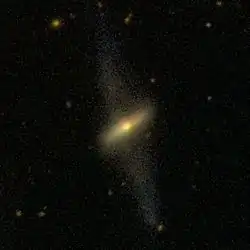| UGC 9796 | |
|---|---|
 SDSS image of UGC 9796 | |
| Observation data (J2000 epoch) | |
| Constellation | Boötes |
| Right ascension | 15h 15m 56.30625s[1] |
| Declination | +43° 10′ 00.4797″[1] |
| Redshift | 0.017980[2] |
| Heliocentric radial velocity | 5342 km/s[2] |
| Distance | 264.8 ± 18.6 Mly (81.20 ± 5.69 Mpc)[3] |
| Characteristics | |
| Type | S0? |
| Other designations | |
| PGC 54461, UGC 9796, MCG +07-31-48, PRC A-06, FGC 224A, ASK 403591.0, II Zw 73[2] | |
UGC 9796 is a lenticular and polar-ring galaxy in the constellation Boötes, and about 250 million light years distant from Earth. It is an object of great scientific interest as there have been very few polar ring galaxies discovered. UGC 9796 is a very gas-rich environment hosting as much 5×109 solar masses of neutral hydrogen.[4] DSS and SDSS images show that it is very similar to polar ring galaxy NGC 660, the best-known of all the polar ring galaxies.
This object is also known as PGC 54461, MCG+07-31-48, and PRC A-06
References
- 1 2 Brown, A. G. A.; et al. (Gaia collaboration) (August 2018). "Gaia Data Release 2: Summary of the contents and survey properties". Astronomy & Astrophysics. 616. A1. arXiv:1804.09365. Bibcode:2018A&A...616A...1G. doi:10.1051/0004-6361/201833051. Gaia DR2 record for this source at VizieR.
- 1 2 3 "UGC 9796". SIMBAD. Centre de données astronomiques de Strasbourg. Retrieved 2021-03-13.
- ↑ "Results for object NGC UGC 9796 (UGC 9796)". NASA/IPAC Extragalactic Database. California Institute of Technology. Retrieved 2021-03-13.
- ↑ Cox, A. L.; Sparke, L. S.; van Moorsel, G. (February 2006). "Neutral Hydrogen in the Polar Ring Galaxy UGC 9796". The Astronomical Journal. 131 (2): 828–836. Bibcode:2006AJ....131..828C. doi:10.1086/498726. S2CID 121208759.
- "NASA/IPAC Extragalactic Database − NED". Archived from the original on 1997-12-22. Retrieved 2014-02-20.
This article is issued from Wikipedia. The text is licensed under Creative Commons - Attribution - Sharealike. Additional terms may apply for the media files.